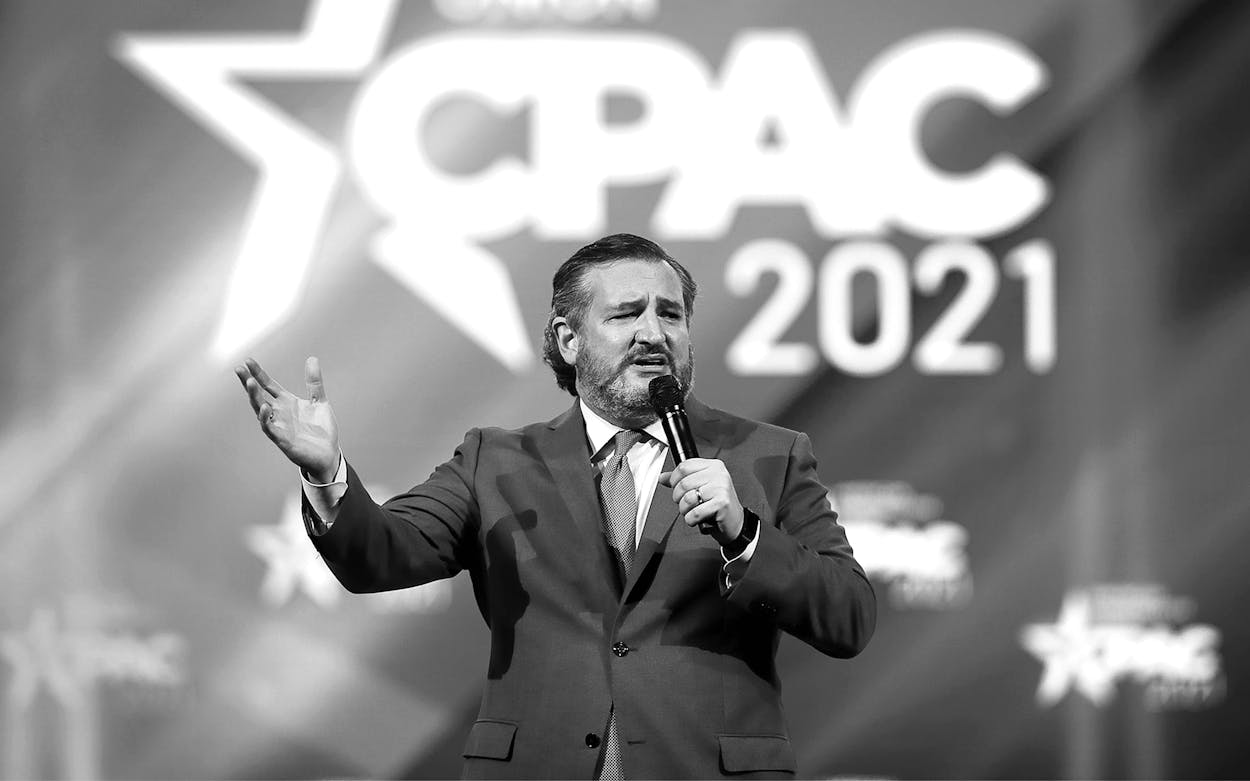Ted Cruz spoke softly and seemed contrite in a 22-minute interview with Tom Abrahams on ABC 13 in Houston on February 18, explaining how he had come to take his wife and two daughters to the Ritz-Carlton in Cancún during the deep freeze and power outages that were brutally punishing Texas. His home, like those of millions of other Texans, had been without power or water, he explained, and his daughters, whose schools were closed for the week, asked if the family could go someplace warm. But overnight in Mexico, Cruz had become an object of savage national scorn and derision for what seemed a spectacular failure of empathy and a want of basic political smarts. Amid the tempest, he returned to Texas, leaving the family on vacation.
In the moment, the lapse in political judgment seemed like it could mark the end of any serious future national prospects of Cruz. Indeed, a Morning Consult tracking poll released Monday found that after his Cancún trip, only 49 percent of Republican voters viewed the senator favorably, a drop of nine points from mid-February. Among Texas voters at large, his net approval rating went from plus six to minus five points. And yet, eight days after bowing his head and apologizing on local news, Cruz took the stage at the Conservative Political Action Conference in Orlando with an unabashed and unchastened tone, opening with a defiant joke. “I gotta say, Orlando is awesome. It’s not as nice as Cancún,” he said to laughter. “But it’s nice.”
In the seventeen-minute speech that followed, Cruz never apologized or mentioned the cataclysmic blackouts in Texas that, apart from the human cost to so many of his constituents, have also put on the line Texas Republicans’ reputation for being able to run a state that they have owned politically for more than a generation. Of course, Cruz wasn’t at CPAC as a senator from Texas. He was there, in the shadow of Donald Trump, who spoke Sunday, to blow on the embers of his presidential ambitions. CPAC’s theme was “America Uncanceled,” and Cruz’s talk—opening with the jest about Cancún and crescendoing into a hoarse scream of “FREEDOM!,” a la Braveheart’s William Wallace—delivered on that motif.
Cruz hit the standard notes a national politician vying for Trump’s base might be expected to hit. He ridiculed New York congresswoman Alexandria Ocasio-Cortez for fearing for her life when rioters seeking to overturn the election result stormed the Capitol. “And AOC is telling us she was murdered,” Cruz said, wringing the last word for comic effect. The belittling of the congresswoman was particularly striking because Cruz, in his interview with Abrahams, specifically described the “respect and civility” he accorded AOC despite their political differences. (It was even more unseemly because she had personally raised $5 million in disaster relief for Texans and traveled to Houston the previous week.)
Next, Cruz, who had quarantined after last year’s CPAC after contact with someone who’d contracted COVID, offered red meat about the pandemic response. He mocked the “statists” who would have us “wear masks for the next three hundred years” and who chose to wear multiple face coverings—“How much virtue do you want to signal?” the senator asked—and then concluded with a riff on liberals being easily offended, at one point offering an impression of an upset leftist.
Thanks to his CPAC performance, and its culminating scream, Cruz made it into Saturday Night Live’s cold open for the third Saturday in a row, where he was played by Aidy Bryant. (In his speech Cruz also said cancel culture had made the sketch comedy show “unwatchable.”) It seemed he might finally have achieved the grip on the attention of conservatives and liberal satirists alike that had helped propel Trump to the White House.
Unfortunately for Cruz, his political conundrum remains what it has been since Trump vanquished him in their bitter battle for the Republican presidential nomination in 2016. Any future national prospects depend on a fierce loyalty to Trump—a loyalty that, if truly adhered to, could effectively scuttle his own ambitions. Five years after winning a CPAC straw poll in the midst of a presidential run, Cruz found himself a distant fourth in a poll on Sunday, pulling in 2 percent support to be the party’s 2024 nominee against Trump’s 55 percent. Even when the forty-fifth president was removed from the poll, Cruz was only tied for fourth with former Secretary of State Mike Pompeo, distantly trailing Florida governor Ron DeSantis, whose home state hosted the conference, and behind South Dakota governor Kristi Noem and Donald Trump Jr. (Texas governor Greg Abbott pulled in 0.1 percent of the vote.)
And Sunday, when Trump took the stage to deliver a ninety-minute speech—his first since leaving office—it was clear whom the party rank-and-file still revere most. To thunderous applause, Trump repeated his unfounded claim that he won the election and teased his 2024 plans: “Who knows, I may even decide to beat them for a third time.”
Earlier in the day, Cruz had also intimated that the president would remain a presence in the party. “There are a whole lot of voices in Washington that want to just erase the last four years,” Cruz said. “Let me tell you this right now, Donald J. Trump ain’t going anywhere.” It was his biggest applause line of the day and brought many in his audience to their feet.
- More About:
- Politics & Policy
- Ted Cruz
- Donald Trump






